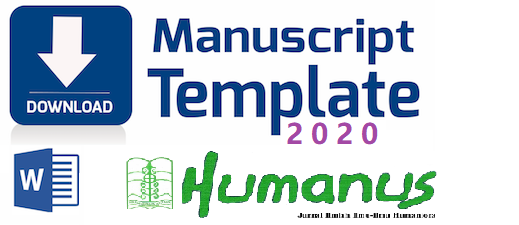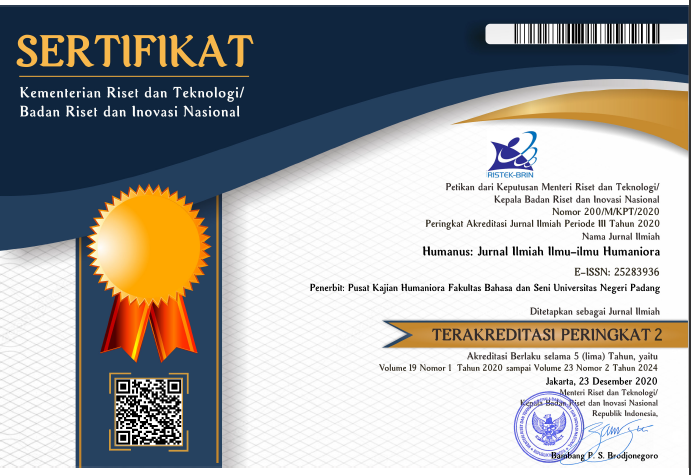Critical Discourse Analysis on King Salman’s Speeches at the United Nations General Assembly
 ), Syofyan Hadi(2), Annisa Khairunnisa(3), Azizah Fitrah(4), Awliya Rahmi(5), Melisa Rezi(6),
), Syofyan Hadi(2), Annisa Khairunnisa(3), Azizah Fitrah(4), Awliya Rahmi(5), Melisa Rezi(6), (1) Universitas Islam Negeri Imam Bonjol Padang
(2) Universitas Islam Negeri Imam Bonjol, Padang
(3) Universitas Islam Negeri Sunan Kalijaga Yogyakarta
(4) Universitas Islam Negeri Imam Bonjol, Padang
(5) Universitas Islam Negeri Imam Bonjol, Padang
(6) Universitas Islam Negeri Imam Bonjol, Padang
 Corresponding Author
Corresponding Author
Copyright (c) 2024 Reflinaldi Reflinaldi, Syofyan Hadi, Annisa Khairunnisa
DOI : https://doi.org/10.24036/humanus.v23i2.127205
Full Text:
 Language : en
Language : en
Abstract
Keywords
References
Abdelaal, N. M., Alisood, A. M., & Sase, A. S. (2015). Investigating Obama’s Ideology in his Speech on Islamic State of Iraq and Levant (ISIL). Journal of Applied Linguistics and Language Research, 2(7), 228–246. www.jallr.ir
Abuín-Vences, N., Cuesta-Cambra, U., Niño-González, J. I., & Bengochea-González, C. (2022). Hate speech analysis as a function of ideology: Emotional and cognitive effects. Comunicar, 30(71), 1–11. https://doi.org/10.3916/C71-2022-03
Alemi, M., Latifi, A., & Nematzadeh, A. (2018). Persuasion in political discourse: Barak obama’s presidential speeches against ISIS. Russian Journal of Linguistics, 22(2), 278–291. https://doi.org/10.22363/2312-9182-2018-22-2-278-291
Al-Khawaldeh, N., Al-Nusairat, M., Rababah, L.M., Al-Khawaldeh, S. (2024). The Ideology of Tolerance in King Abdullah ’ s Speeches : A Critical Discourse Analysis Study. International Journal of Arabic and English Studies 24(2). https://doi.org/10.33806/ijaes.v24i2.589
Altikriti, S. (2016). Persuasive Speech Acts in Barack Obama’s Inaugural Speeches (2009, 2013) and The Last State of the Union Address (2016). International Journal of Linguistics, 8(2), 47. https://doi.org/10.5296/ijl.v8i2.9274
Anisimova, M. (2017). Argumentation in speeches of the Security Council of the United Nations Organizations.
Badache, F., Hellmüller, S., & Salaymeh, B. (2022). Conflict management or conflict resolution: how do major powers conceive the role of the United Nations in peacebuilding? Contemporary Security Policy, 43(4), 547–571. https://doi.org/10.1080/13523260.2022.2147334
Baturo, A., & Dasandi, N. (2017). What drives the international development agenda? An NLP analysis of the united nations general debate 1970-2016. Conference Proceedings - 2017 International Conference on the Frontiers and Advances in Data Science, FADS 2017, 2018-Janua(1), 171–176. https://doi.org/10.1109/FADS.2017.8253221
Baturo, A., Dasandi, N., & Mikhaylov, S. J. (2017). Understanding state preferences with text as data: Introducing the UN general Debate corpus. Research and Politics, 4(2). https://doi.org/10.1177/2053168017712821
Bennett, D. L., Boudreaux, C., & Nikolaev, B. (2023). Populist discourse and entrepreneurship: The role of political ideology and institutions. Journal of International Business Studies, 54(1), 151–181. https://doi.org/10.1057/s41267-022-00515-9
Bushell, S., Buisson, G. S., Workman, M., & Colley, T. (2017). Strategic narratives in climate change: Towards a unifying narrative to address the action gap on climate change. Energy Research and Social Science, 28(September 2016), 39–49. https://doi.org/10.1016/j.erss.2017.04.001
Carmines, E. G., & D’Amico, N. J. (2015). The new look in political ideology research. Annual Review of Political Science, 18, 205–216. https://doi.org/10.1146/annurev-polisci-060314-115422
Ebniya, Z. O. (2020). The impact of religious values in the Jordanian political discourses on public opinion (field study on universities students). Review of Economics and Political Science, ahead-of-p(ahead-of-print). https://doi.org/10.1108/reps-08-2019-0116
Engesser, S., Ernst, N., Esser, F., & Büchel, F. (2017). Populism and social media: how politicians spread a fragmented ideology. Information Communication and Society, 20(8), 1109–1126. https://doi.org/10.1080/1369118X.2016.1207697
Fairclough, N. (2013). Critical discourse analysis. The Routledge Handbook of Discourse Analysis, January 2001, 9–20. https://doi.org/10.4324/9780203809068-8
Haj Omar, H. (2020). Ideology in the Translation of Political Speeches during the Arab-Israeli Conflict: A Critical Discourse Analysis. TranscUlturAl: A Journal of Translation and Cultural Studies, 12(2), 19–38. https://doi.org/10.21992/tc29460
Jones, A. (2020). Manipulating Diplomatic Atmospheres: The United Nations Security Council and Syria. Annals of the American Association of Geographers, 110(5), 1369–1385. https://doi.org/10.1080/24694452.2019.1696665
Jones, A., & Clark, J. (2019). Performance, Emotions, and Diplomacy in the United Nations Assemblage in New York. Annals of the American Association of Geographers. https://doi.org/10.1080/24694452.2018.1509689
Kadwa, M. S., & Alshenqeeti, H. (2020). International Journal of Linguistics, Literature and Translation (IJLLT) The Impact of Students’ Proficiency in English on Science Courses in a Foundation Year Program. International Journal of Linguistics, Literature and Translation (IJLLT), 3(11), 55–67. https://doi.org/10.32996/ijllt
Kazemian, B., & Hashemi, S. (2014). Critical discourse analysis of Barack Obama’s 2012 speeches: Views from systemic functional linguistics and Rhetoric. Theory and Practice in Language Studies, 4(6), 1178–1187. https://doi.org/10.4304/tpls.4.6.1178-1187
Kentikelenis, A., & Voeten, E. (2018). Exit , Voice , and Loyalty towards Liberal International Institutions : Evidence from United Nations Speeches 1970-2017 Alexander Kentikelenis and. International Political Economy Society Conference, 0–23. https://www.internationalpoliticaleconomysociety.org/sites/default/files/paper-uploads/2018-10-30-14_53_43-ev42@georgetown.edu.pdf
Khaled, D. Y. A. (2020). A critical discourse analysis of Benjamin Netanyahu’s speech at the United Nations General Assembly in 2014. International Journal of Linguistics , Literature and Translation, 3(3), 34–47.
Khalil, H. H. (2021). A pragma- semantic model for ideology identification in political media discourse: An interdisciplinary methodology for the socio- cognitive approach. 3L: Language, Linguistics, Literature, 26(4), 28–44. https://doi.org/10.17576/3L-2020-2604-03
Khan, M. H., Adnan, H. M., Kaur, S., Khuhro, R. A., Asghar, R., & Jabeen, S. (2019). Muslims’ representation in Donald Trump’s anti-muslim-islam statement: A critical discourse analysis. Religions, 10(2), 1–16. https://doi.org/10.3390/rel10020115
Khan, M. H., Adnan, H. M., Kaur, S., Qazalbash, F., & Ismail, I. N. (2020). A Critical Discourse Analysis of Anti-Muslim Rhetoric in Donald Trump’s Historic 2016 AIPAC Policy Speech. Journal of Muslim Minority Affairs, 40(4), 543–558. https://doi.org/10.1080/13602004.2020.1828507
Khan, M. H., Qazalbash, F., Adnan, H. M., Yaqin, L. N., & Khuhro, R. A. (2021). Trump and Muslims: A Critical Discourse Analysis of Islamophobic Rhetoric in Donald Trump’s Selected Tweets. SAGE Open, 11(1). https://doi.org/10.1177/21582440211004172
Khawaldeh, S. K., & Hatab, W. abu. (2018). King Abdullah II Anti-Terrorism Ideology: A Critical Discourse Analysis Perspective. International Journal of Linguistics, 10(6), 97. https://doi.org/10.5296/ijl.v10i6.13202
Kissas, A. (2017). Ideology in the age of mediatized politics: From ‘belief systems’ to the re-contextualizing principle of discourse. Journal of Political Ideologies, 22(2), 197–215. https://doi.org/10.1080/13569317.2017.1306958
Klimeš, O., & Marinelli, M. (2018). Introduction: Ideology, Propaganda, and Political Discourse in the Xi Jinping Era. Journal of Chinese Political Science, 23(3), 313–322. https://doi.org/10.1007/s11366-018-9566-3
Lafta, H. T. (2020). Power and Ideology in Donald Trump‟s Speech at the United Nations: A Critical Discourse Analysis. International Journal of Psychosocial Rehabilitation, 24(5), 5498–5509. https://doi.org/10.37200/ijpr/v24i5/pr2020257
Latupeirissa, D. S., Laksana, I. K. D., Artawa, K., & Sosiowati, I. G. A. G. (2019a). On political language ideology: Critical view of indonesian president speech. Journal of Language Teaching and Research, 10(4), 843–850. https://doi.org/10.17507/jltr.1004.23
Latupeirissa, D. S., Laksana, I. K. D., Artawa, K., & Sosiowati, I. G. A. G. (2019b). Revealing ideology of political speech. International Research Journal of Management, IT and Social Sciences, 6(2), 79–91. https://doi.org/10.21744/irjmis.v6n2.654
Lees, N. (2023). The endurance of the G77 in international relations: South-South ideology and voting at the United Nations 1970-2015. Japanese Journal of Political Science, 24(3), 310–330. https://doi.org/10.1017/S1468109923000105
Luo, Y. (2021). “Facing the virus” anaphora in political speech: a faircloughian analysis of president Xi Jinping’s address to United Nations general assembly. Linguistics and Culture Review, 5(S1), 1039–1053. https://doi.org/10.21744/lingcure.v5ns1.1490
Masroor, F., Khan, Q. N., Aib, I., & Ali, Z. (2019). Polarization and Ideological Weaving in Twitter Discourse of Politicians. Social Media and Society, 5(4). https://doi.org/10.1177/2056305119891220
Matar, D. (2019). The Syrian regime’s strategic communication: Practices and ideology. International Journal of Communication, 13, 2398–2416.
Mitrani, M. (2017). The Discursive Construction of the International Community: Evidence from the United Nations General Assembly. KFG Working Paper Series, 78, 1–30. http://nbn-resolving.de/urn:nbn:de:0168-ssoar-51596-1
Mochtak, M., Glaurdić, J., & Lesschaeve, C. (2022). Talking War: Representation, Veterans and Ideology in Post-War Parliamentary Debates. Government and Opposition, 57(1), 148–170. https://doi.org/10.1017/gov.2020.25
Muller, A. (2015). Using discourse network analysis to measure discourse coalitions: Towards a formal analysis of political discourse. World Political Science, 11(2), 377–404. https://doi.org/10.1515/wps-2015-0009
Naeem, W., Hussain, M., & Shah, R. H. (2022). Ideology In Political Discourses : A Critical Discourse Analysis Of Pakistan Democratic Movement Leaders ’ Speeches In 2020. 6(10), 4475–4487.
Pressman, J. (2020). ‘History in conflict: Israeli–Palestinian speeches at the United Nations, 1998–2016.’ Mediterranean Politics, 25(4), 476–498. https://doi.org/10.1080/13629395.2019.1589936
Rahmaida, A. P., & Cahyono, S. P. (2022). The ideology of donald trump and joe biden in their political speeches through appraisal of attitude. UJARAN (Undergraduate Journal for Academic Research in Humanities, 1(01), 14–29. http://publikasi.dinus.ac.id/index.php/ujaran/index
Rauf, A., Sajjad, F., & Malghani, M. (2019). Ideology, (Mis)perceptions and (Re)construction of Political Identities: A Critical Discourse Analysis of Imran Khan’s Political Speeches. Global Social Sciences Review, IV(I), 205–210. https://doi.org/10.31703/gssr.2019(iv-i).27
Raza, A. A., Abbas, I., & Naeem, W. (2022). FRAMING IDEOLOGY AND POWER : A CRITICAL DISCOURSE ANALYSIS OF NAWAZ SHAREEF SPEECHES. 19(4), 61–73.
Reflinaldi, R., Faisol, Y., Hadi, S., & Ilyas, E. (2024). How to Build Strategic Communication : Speech Act Analysis on King Salman’s Speeches at the United Nations General Assembly. Journal of Pragmatics and Discourse Research 4(01). http://dx.doi.org/10.51817/jpdr.v4i1.742
Rempala, D. M., Okdie, B. M., & Garvey, K. J. (2016). Articulating ideology: How liberals and conservatives justify political affiliations using morality-based explanations. Motivation and Emotion, 40(5), 703–719. https://doi.org/10.1007/s11031-016-9563-9
Renaldo, Z. A. (2021). Presupposition and Ideology: a Critical Discourse Analysis of Joe Biden’S Inaugural Speech. PROJECT (Professional Journal of English Education), 4(3), 497. https://doi.org/10.22460/project.v4i3.p497-503
Reynolds, C. (2019). Building Theory From Media Ideology: Coding for Power in Journalistic Discourse. Journal of Communication Inquiry, 43(1), 47–69. https://doi.org/10.1177/0196859918774797
Saad, H., & Jubran, Y. (2020). Sexism in Trump ’ s Political Speeches : A Critical Discourse Analysis Approach. 6(5). https://doi.org/10.5281/zenodo.4385004
Sharififar, M., & Rahimi, E. (2015). Critical Discourse Analysis of Political Speeches: A Case Study of Obama’s and Rouhani’s Speeches at UN. Theory and Practice in Language Studies, 5(2), 343. https://doi.org/10.17507/tpls.0502.14
Susilowati, M., & Ulkhasanah, W. (2021). Ideology and Power in Presidential Speech. Proceedings of the International Conference on Engineering, Technology and Social Science (ICONETOS 2020), 529(Iconetos 2020), 860–867. https://doi.org/10.2991/assehr.k.210421.123
Van Dijk, T.A. (2006a). Politics, Ideology, Discourse. A Cultural History of the Avant-Garde in the Nordic Countries 1900-1925, 1970, 529–539. https://doi.org/10.1163/9789401208918_037
Van Dijk, T. A. (2006b). Ideology and discourse analysis. Journal of Political Ideologies, 11(2), 115–140. https://doi.org/10.1080/13569310600687908
Van Dijk, T. A. (2006c). Discourse and manipulation. Discourse and Society, 17(3), 359–383. https://doi.org/10.1177/0957926506060250
Williamson, J. G. (2015). Barack Obama and the Rhetoric of Hope. Rhetoric and Public Affairs, 18(4), 748–750. https://doi.org/10.14321/rhetpublaffa.18.4.0748
Winter, C. (2020). Redefining ‘Propaganda’: The Media Strategy of the Islamic State. RUSI Journal, 165(1), 38–42. https://doi.org/10.1080/03071847.2020.1734321
Yahya, A. A. (2020). The Construction of Ideology in Political Discourse: A Deictic Analysis. International Journal of Applied Linguistics and English Literature, 9(2), 1. https://doi.org/10.7575/aiac.ijalel.v.9n.2p.1
Youssef, S., & Albarakati, M. (2020). Presupposition Use in Arabic Political Discourse: The Case of King Salman Speech on Terrorism. International Journal of English Linguistics, 11(1), 22. https://doi.org/10.5539/ijel.v11n1p22
Zheni, T. (2018). Factive vs. Ideological Knowledge in Political Discourse. International Journal of English Linguistics, 9(1), 36. https://doi.org/10.5539/ijel.v9n1p36
 Article Metrics
Article Metrics
 Abstract Views : 137 times
Abstract Views : 137 times
 PDF Downloaded : 47 times
PDF Downloaded : 47 times
Refbacks
- There are currently no refbacks.
Copyright (c) 2024 Reflinaldi Reflinaldi, Syofyan Hadi, Annisa Khairunnisa

This work is licensed under a Creative Commons Attribution-NonCommercial 4.0 International License.










